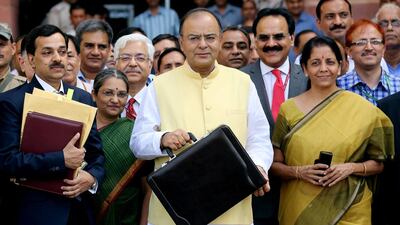NEW DELHI // Prime minister Narendra Modi's government used its first budget to tackle the national deficit and lacklustre economy, but could not resist playing safe and including a host of populist disbursements.
Arun Jaitley, the finance minister, presented the 18 trillion rupee (Dh1.1 trillion) budget on Thursday in a speech that lasted for more than two hours.
Admitting that the country faced a "challenging situation" – after two consecutive years of growth below 5 per cent and a deficit of 4.5 per cent – Mr Jaitley said the government needed more time to sort through the problems it faced.
"It would not be wise to expect everything that can be done or must be done to be in the first budget presented within 45 days of the formation of this government," he said.
"The budget is a new ray of hope for the poor and downtrodden sections of society," Mr Modi said, adding that it would revive India's "moribund economy".
Mr Modi campaigned on promises of economic reforms, bold cuts in subsidies and welfare, and the easing of foreign investment rules. But Mr Jaitley's budget carried only faint hints of that economic ideology, said John Samuel Raja, a co-founder of How India Lives, a firm that analyses public data.
"The dramatic measures that Modi talked about, and that many people expected, were missing," Mr Raja told The National. "Maybe they've realised the limitations of actually governing, which is why they've taken the safe route of making incremental changes.
"But if there was ever a time for boldness, it was in this budget. Two years down the line, the government will be tied down to other political realities. Now it's coming fresh off a huge mandate."
Among the most significant aspects of the budget was its reluctance to slash spending on welfare and subsidies, he added.
Although Mr Jaitley proposed "to overhaul the subsidy regime, including food and petroleum subsidies", he did not provide details on how changes would be made.
In fact, the total payment towards subsidies was increased by 60 billion rupees in this budget, compared to the previous year.
Instead, Mr Jaitley only outlined an idea to set up a government commission to scrutinise state expenditure more closely.
"We cannot be oblivious of the fact that there is a large population of this country which is below the poverty line," Mr Jaitley said. "We have to ensure that our anti-poverty programmes are well targeted."
Individual taxpayers did not receive the kind of massive relief that many expected. Tax slabs were slightly tweaked to raise the exemption threshold to 250,000 rupees, and the upper limits on other tax exemptions were raised as well. But these small changes, Mr Raja said, would not subtract much from the government's revenue.
The hallmark of Mr Modi's economic planning seemed to be "small initiatives over a variety of fronts, keep the pressure on, and occasionally go for the big initiative", said Subir Gokarn, director of research at the Brookings India think tank.
Mr Jaitley has proposed plugging the deficit by making India's business environment more welcoming, hoping that it will spur investment and result in renewed economic growth "of 7-8 per cent or above within the next 3-4 years". The government also plans to sell parts of its stakes in public sector companies, hoping to raise 2.4 trillion rupees by 2018.
In this way, he hopes to drag down the government's fiscal deficit to 4.1 per cent by the end of this financial year, 3.6 per cent by 2015-16, and 3 per cent by 2016-17.
Avoiding the touchy issue of allowing foreign investment in the retail sector, which critics claim will put thousands of neighbourhood grocers out of business, Mr Jaitley instead permitted Indian defence manufacturing and insurance companies to sell stakes of up to 49 per cent to foreign investors, up from the 26 per cent permitted currently.
Mr Jaitley also announced 28 programmes with budgets of a billion rupees each, including a television channel to broadcast real-time information to farmers, a study to examine the feasibility of interlinking India's rivers, a national war memorial, a sports university in the north-eastern state of Manipur, and a fund to educate young girls.
ssubramanian@thenational.ae

Modi offers ‘hope for the poor and downtrodden’ in India budget
Prime minister Narendra Modi campaigned on promises of economic reforms, bold cuts in subsidies and welfare, and the easing of foreign investment rules - but his government's first budget carried only faint hints of that economic ideology.
Most popular today
